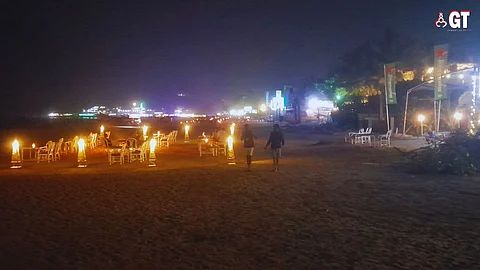

Arambol, in North Goa, is developing into the epicenter of tourism. The once sleepy village, with a sweet water lake and a clean stretch of beach, is today home to those searching for the truth in their lives.
A home to hippies in the 1980s, Arambol is now home to visitors from Russia, Poland, tourists from other European countries and from India – all in search of a space away from society.
There is just one resort close to Arambol, but it has many guest houses, homestays and apartments to rent. It is the right place for the middleclass tourist who seeks to be away from the crowds.
Transport is available and the place has many restaurants sprouting up near the beach or close to the river, with most run by people from outside the State.
Burman, in his late 30s, has been living here for the last three months and hopes to stay longer.
“This place just gets the best out of me. Here, I do not feel the stress I feel at other places. The music just flows,” says the musician from Kolkata.
“I live the way I want, with no one asking me questions, and I play the music I want with most listening and enjoying it. This is my definition of a simple life,” he says.
If accommodation near the beach is expensive, places up the mountain cost between Rs 5,000 to 10,000 – depending on the facilities available, and some even have air conditioning.
Mud baths, yoga centres, Osho centre, meditation, dance, music class and even drum classes are on offer if one decides to make Arambol a holiday destination. There is even an ISKCON group that thrills those enjoying the sunset on the beach.
There are few shacks on the beach and one needs to check the taste for ones self, but most are open well past 10 pm and booze is no problem for those who wish to idle their time by the sea with a drink.
Well-lit handcarts can be found on the beach till around midnight because somewhere in the vicinity, a small party will be ending, and its guests seeking a small bite.
Most parties are organised by foreigners, but are not loud. Here, people enjoy a good time. There is a board outside that says no drugs and alcohol allowed, and once in, the yoga session starts, followed by meditation and dancing. For Rs 500, a guest gets three hours of bliss.
“Though it is mostly Russians and other foreigners out at night, a lot of Indian tourists have joined the circuit, and their number is increasing. For Indian tourists, a mud bath is an experience here,” says Manda, who runs a wellness centre.
Restaurants with exquisite cuisine, elegant interiors and bars stocked with high-end alcohol are now common in Arambol, and they appear to be catering to high-end tourists from India, for whom it is beginning to be a getaway from the now-crowded Anjuna and Vagator beaches.
Shops are open way past midnight and most restaurants are up around the same time with just a few – where parties are discreetly held – spots staying open till dawn.
The locals are easygoing people, not aggressive, with religion restricted to the inner confines, and not outwardly on display. There is a church, a temple and a mosque, but, most importantly, tolerance is written large.